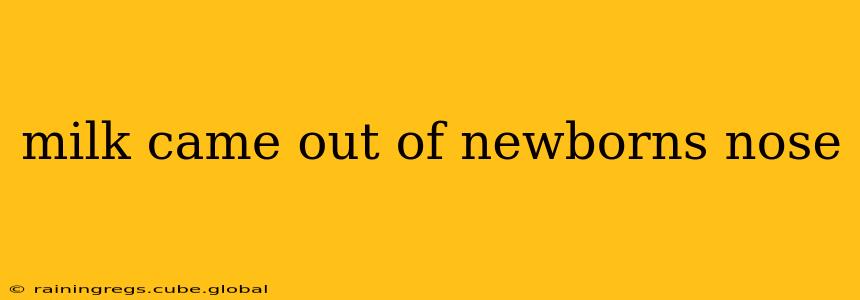It's alarming to see milk coming out of your newborn's nose, but this is actually a fairly common occurrence, often nothing to worry about. This article will explain why this happens, when you should be concerned, and what you can do to help.
Why Does Milk Come Out of My Baby's Nose?
The primary reason milk emerges from a newborn's nose is the connection between their nasal passages and their mouth. Newborns have a naturally shorter and wider connection between these areas compared to older children and adults. This means that during feeding, some milk can easily travel up the back of their throat and into their nasal passages. They haven't yet mastered the coordinated swallowing and breathing needed to prevent this reflux. It's essentially a slightly less efficient version of swallowing.
What if my baby is spitting up milk from their nose and mouth?
While some nasal milk leakage is normal, excessive spitting up from both the nose and mouth could indicate a problem. This should prompt a call to your pediatrician. They can rule out conditions like gastroesophageal reflux (GER), which while common, can be more serious in some cases. They may also want to investigate potential issues with feeding technique or underlying health concerns.
Is there a connection between milk coming out of the nose and cleft palate/lip?
While not directly causal, a cleft palate or lip can increase the likelihood of milk coming out of the newborn's nose. These conditions affect the structure of the mouth and palate, making it more difficult for a baby to create a proper seal during feeding, leading to more milk entering the nasal passages. If you suspect your baby has a cleft palate or lip, seek immediate medical attention. These conditions usually require specialized care and feeding strategies.
My baby's nose is stuffy, and milk keeps coming out; is this normal?
A stuffy nose can exacerbate the issue. If your baby's nasal passages are blocked, even a small amount of milk reflux can be more noticeable as it has a harder time draining. Consider using saline drops and a bulb syringe to gently clear your baby's nasal passages. However, persistent nasal congestion warrants a consultation with your pediatrician. They may need to check for underlying infections or allergies.
How can I prevent milk from coming out of my baby’s nose?
There isn't a foolproof method to entirely prevent milk from occasionally entering your baby's nose. However, these strategies can minimize the occurrence:
- Burping Frequently: Burping your baby frequently during and after feedings helps release trapped air and reduces pressure in the stomach, minimizing reflux.
- Proper Feeding Position: Hold your baby upright during feeding. This helps prevent milk from flowing back up.
- Feeding Technique: Ensure a proper latch to minimize air intake and maximize effective feeding. A lactation consultant can help perfect your technique.
- Smaller, More Frequent Feedings: Smaller feedings may be less likely to lead to forceful reflux.
When to See a Doctor
While occasional milk in your baby's nose is often harmless, contact your pediatrician if:
- Your baby is consistently spitting up large amounts of milk.
- The milk is green, yellow, or bloody.
- Your baby is lethargic, fussy, or showing other signs of illness.
- Your baby is experiencing significant weight loss or failure to thrive.
- You suspect a cleft palate or lip.
- Your baby's nasal congestion persists.
Remember, this information is for general knowledge and does not replace professional medical advice. Always consult your pediatrician with any concerns about your newborn's health. They can provide personalized guidance based on your baby's individual needs.
